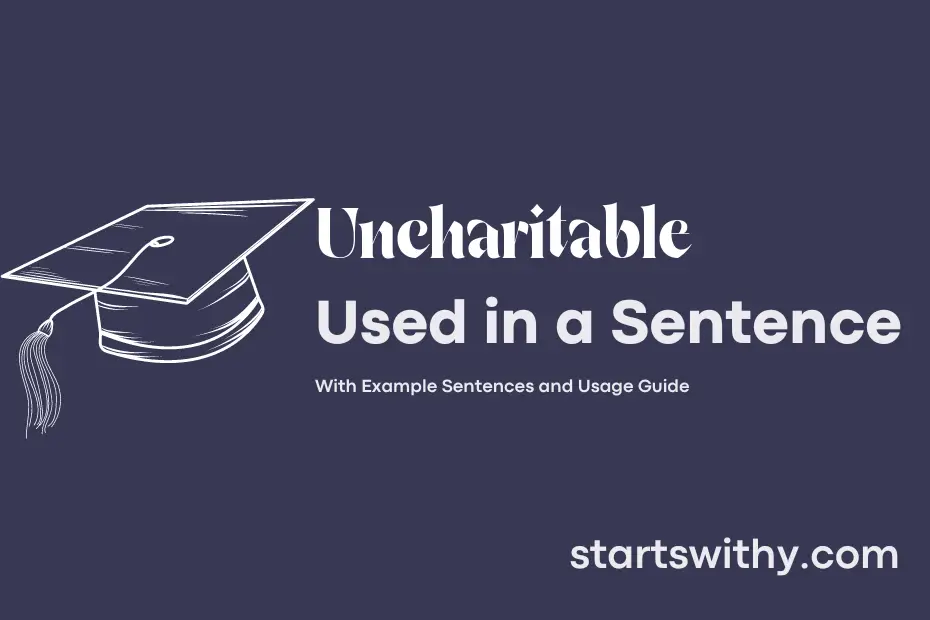Have you ever encountered a statement or action that was not only critical but also lacking in compassion or generosity? This is what we refer to as being “uncharitable.” When someone is uncharitable, they are showing a lack of kindness, sympathy, or understanding towards others. This behavior can manifest in various forms, such as harsh judgments, unkind remarks, or a dismissive attitude.
Being uncharitable can not only hurt others but also create a toxic atmosphere that impacts relationships and interactions. It is important to be mindful of our words and actions to ensure that we are fostering a positive and supportive environment. By practicing empathy and kindness, we can strive to be more charitable in our thoughts, words, and deeds.
7 Examples Of Uncharitable Used In a Sentence For Kids
- Uncharitable means not being kind or helpful.
- It’s important to always be kind and not uncharitable to others.
- We should always try to help others and not be uncharitable.
- Being uncharitable can make others feel sad.
- Let’s remember to always be kind and not uncharitable.
- When we are uncharitable, it can hurt other people’s feelings.
- It’s better to be nice and helpful than to be uncharitable.
14 Sentences with Uncharitable Examples
- She made an uncharitable comment about her classmate’s presentation.
- The professor’s feedback was surprisingly uncharitable on the group project.
- I overheard an uncharitable remark about the guest speaker in the auditorium.
- His review of the new cafeteria menu was quite uncharitable.
- The seniors’ attitude towards the juniors was quite uncharitable during the orientation week.
- I received some uncharitable advice from my roommate about how to study for exams.
- The reaction to the fundraising campaign was unexpectedly uncharitable among the student body.
- The professor’s strict grading seemed a bit uncharitable to some students.
- The criticism of the event planning committee was surprisingly uncharitable.
- She received an uncharitable response when she asked for help with her assignment.
- An uncharitable judgment was made about the new sports team on campus.
- The group’s decision to exclude some members from the project seemed quite uncharitable.
- The reaction to the student council’s proposal was overwhelmingly uncharitable.
- The teacher’s reaction to the late submission was unexpectedly uncharitable.
How To Use Uncharitable in Sentences?
To use the word “Uncharitable” in a sentence, you can describe someone or something that lacks kindness, generosity, or sympathy toward others. Here is an example to help beginners understand how to incorporate this word into a sentence:
- “Her uncharitable remarks about the less fortunate revealed her lack of compassion for those in need.”
In this sentence, the word “Uncharitable” is used to highlight the insensitivity and unkindness of the person making negative comments about those who are less fortunate.
When using the word “Uncharitable,” it’s essential to ensure that the context of the sentence reflects a lack of charitable or compassionate behavior. You can refer to behaviors, comments, attitudes, or actions that demonstrate a lack of kindness or generosity towards others.
By incorporating uncharitable into your sentences, you can effectively convey a sense of negativity or lack of concern in various situations. Whether describing a person’s behavior or a specific action, using this word can help you express a lack of compassion or empathy in a concise and impactful way.
As you continue to practice using the word “Uncharitable” in different sentences, you will become more comfortable incorporating it into your vocabulary to express unkind or unsympathetic behavior effectively.
Conclusion
In summary, the examples of sentences with the keyword “uncharitable” demonstrate a lack of generosity or kindness in their tone. These sentences portray a critical or judgmental attitude towards others, lacking empathy and understanding. It is important to be mindful of the language we use and strive to communicate with compassion and respect for others.
By reflecting on the impact of uncharitable statements, we can cultivate a more positive and supportive environment in our interactions with others. Choosing words carefully and practicing empathy in our communication can lead to more meaningful and harmonious relationships, fostering a culture of kindness and understanding in our everyday interactions.



